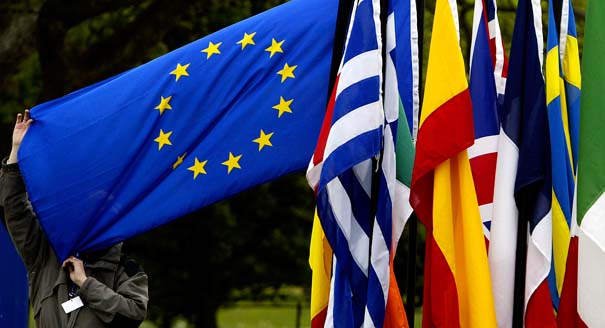A prophetic Romanian novel about a town at the mouth of the Danube carries a warning: Europe decays when it stops looking outward. In a world of increasing insularity, the EU should heed its warning.
Thomas de Waal

Source: Getty
The EU’s lack of ambition as an international actor has little to do with the virtues or flaws of the European character and far more to do with a number of structural factors.
“Economic giant, political pygmy.” No other comment about the European Union’s foreign policy has been quoted more often than this statement—with the possible exception of Henry Kissinger’s demand for a European phone number. No doubt much of this is unfair. As the biggest donor of humanitarian and development assistance, the EU certainly makes a significant contribution to global stability. It has used enlargement to transform and stabilize major parts of the European continent and over the past decade it has greatly expanded and strengthened its foreign policy instruments.
Nonetheless, for a population of 500 million people with one-fifth of the world’s GDP, it is undeniable that the EU punches well below its weight. Ultimately, this comes down to a matter of ambition. For a player of its size and importance the EU collectively displays far too little determination to shape world events, exert influence, defend its interest, and take on international responsibilities.
A number of explanations have been offered to explain this state of affairs. Robert Kagan has claimed that Europeans, who are “from Venus,” are befuddled by the post-modern harmony on their own continent and have simply lost the sense of the use of power that the Americans “from Mars” still possess. Others have celebrated Europe as the “civilian power,” highlighting its preference for a rules-based foreign policy committed to multilateral solutions. They have failed to explain, however, why this supposedly superior approach does not translate into a greater ability to shape international developments.
On closer examination it becomes clear that the EU’s lack of ambition as an international actor has little to do with the virtues or flaws of the European character and far more to do with a number of structural factors.
In the absence of a genuine European public opinion sustained by transnational European media, developments in other continents are almost exclusively perceived from the perspective of a small or middle-sized power. Whereas an American policymaker will approach a new international challenge in full knowledge of the entire panoply of U.S. policy instruments, hardly anybody in Europe will respond to the same event bearing in mind the collective potential of the EU. Seen from the viewpoint of a state with 10, 20, or even 50 million inhabitants many developments will appear distant, hard to influence, and essentially somebody else’s business. Discussions in the EU are therefore all too often characterized by a cumulative small state mind-set, which naturally tends toward less ambitious outcomes.
These national perspectives, which are the point of departure for framing the EU’s policies, are shaped by the vastly different capabilities, ambitions, and historical experiences of the individual member states. They range from the United Kingdom, France, and Germany who still strive to play a role on the global stage, to significant players on the regional level such as Italy, Spain, and Poland, to mini-states like Luxembourg, Malta, and Cyprus. History has turned some European countries into “hawks” and others into instinctive “doves.” It has convinced the majority to seek security in NATO but persuaded others to remain outside the Atlantic alliance. Northerners and Southerners have different sensibilities and priorities. The colonialist and seafaring past of some member states led to a very different worldview from that of Central European states still struggling with the legacy of the Soviet empire. All this diversity complicates the task of developing the coherent vision that would be crucial for forging an ambitious policy.
All member states conduct their own national foreign policies in parallel to the Common Foreign and Security Policy (CFSP). Foreign policy ambition in individual capitals can promote the EU’s influence in world affairs. A case in point was President Sarkozy’s initiative during France’s six-month presidency of the EU in 2008 to mediate in the Russia-Georgia war. However, national ambition can also impose severe limits on the EU’s role. The United Kingdom and France, for instance, regard their permanent seats in the United Nations Security Council as the crown jewels of their national foreign policy, which they jealously defend against European encroachment.
The fact is that the attitude of bigger EU member states toward the CFSP has often been ambivalent. They consider it useful when they exert visible leadership or when it offers an opportunity to give greater international weight to their own policies, but they are reluctant when they see it as a potential restriction to their room to manoeuvre as individual actors.
There is an interesting contrast here to global trade policy. In negotiations such as the Doha round, even the bigger EU member states are unable to individually safeguard their interests and therefore accept—sometimes grudgingly—that the European Commission adopt a strong leadership role. In the CFSP too, the lack of coherence from the EU and the proliferation of national initiatives come at a significant cost. Nothing demonstrates this more clearly than the generally disappointing record of European efforts to promote peace in the Middle East.
But seen from the perspective of a member state in which a national foreign policy profile continues to be highly valued, the cost-benefit analysis of foreign policy still looks different to that of trade policy. The instant gratification that a high profile Middle East visit by the prime minister or president can bring might well compensate for the lack of a sustainable European influence. From this point of view, it might still be entirely rational to give priority to national initiatives over EU policies.
Smaller member states have less scope for national action and therefore more to gain from EU foreign policy. The CFSP affords them an opportunity to share in political processes in which they would otherwise just be bystanders. Work within the machinery of the CFSP currently constitutes the major part of their foreign policy activities. However, their attitude is not free of ambivalence either. The opportunity of participation comes at a price. Sending soldiers and police officers to faraway regions and contributing to the considerable costs of such operations is not always easy to sell to electorates unaccustomed to international engagement at that level.
While the Lisbon Treaty provides for qualified majority voting in a number of additional areas, on foreign and security policy unanimity remains the rule. On the face of it, it is not obvious why voting on foreign policy should be such a taboo topic. In terms of overall societal impact, the EU regularly votes on equally important issues in other policy areas. Other international bodies such as the UN Security Council regularly vote on very tough foreign and security policy matters. Despite heated discussions on the issue decision-making through unanimity is unlikely to change for one simple reason: qualified majority voting on foreign policy would reverse the relationship between national and EU foreign policy, subordinating the former to the common policy of the 27 member states. A number of member states are not ready for this step nor are they likely to support it in the foreseeable future. Unanimity will therefore remain a major constraint on the EU’s effectiveness as an international actor. While full-fledged blockages remain rare, the need to accommodate dissenting views and to bring everyone on board necessarily reduces the ambition and scope of policy initiatives.
Since the ambition deficit of the EU is based on structural reasons, it is unlikely to be overcome overnight. There are some factors, however, which over time can help the EU to raise its game:
Most of the limiting factors described above can be compensated for by strong and committed leadership. Here the Lisbon Treaty offers the beginning of an answer in providing for a stronger and more focused central foreign policy operation with upgraded instruments. This new institutional framework can help the EU transcend the limitations of the old intergovernmental approach and facilitate a level of leadership similar to the one displayed by the Commission regarding the Community competencies, such as trade. It can also facilitate greater coherence between the CFSP and the other external competencies of the EU. This will only happen, however, if the Lisbon Treaty is implemented in a credible fashion, receives the necessary resources, and enjoys the essential political support of the member states and of the Commission.
Globalization has already brought about a significant convergence of foreign policy interests among member states. Threats arising on different continents have far-reaching consequences on European security, but in many cases the implications for the individual member states are not that different. This will over time reduce the diversity and fragmentation problems described above. Also it is the nature of these challenges that member states can do very little about them individually. Together with the shift of power toward Asia, globalization could thus gradually transform the relationship between national and EU foreign policy. The ability of bigger European countries to remain significant players in their own right is bound to diminish. Just as is already the case in trade negotiations, they might increasingly need the common framework of the EU to preserve their interests and to promote their objectives. If the alternative is collective and individual irrelevance, sheer necessity might drive EU member states closer together.
It is remarkable that at a time of mounting EU scepticism polls consistently indicate significant support for a stronger EU foreign policy. While unhappy about some aspects of European integration, many Europeans seem to understand that the EU is the right level for tackling many of the external challenges of today. When a crisis in a distant country is carried into our living rooms through modern media and there is a broad perception that action must be taken (often called “the CNN effect”), this call for action is frequently deflected to the EU. This should be an incitement for more leadership and more initiatives from Brussels. Today, these increased expectations for the EU to perform as an international actor are still far too often disappointed. However, credible efforts to enhance the effectiveness of European foreign policy could rely on broad public support. This is an area where “more Europe” might be something European citizens actually want.
Carnegie does not take institutional positions on public policy issues; the views represented herein are those of the author(s) and do not necessarily reflect the views of Carnegie, its staff, or its trustees.
A prophetic Romanian novel about a town at the mouth of the Danube carries a warning: Europe decays when it stops looking outward. In a world of increasing insularity, the EU should heed its warning.

Thomas de Waal
For a real example of political forces engaged in the militarization of society, the Russian leadership might consider looking closer to home.

James D.J. Brown
Washington and New Delhi should be proud of their putative deal. But international politics isn’t the domain of unicorns and leprechauns, and collateral damage can’t simply be wished away.

Evan A. Feigenbaum
Senior climate, finance, and mobility experts discuss how the Fund for Responding to Loss and Damage could unlock financing for climate mobility.

Alejandro Martin Rodriguez
Local political and social dynamics will shape the implementation of any peace settlement following Russia’s war against Ukraine—dynamics that adversaries may seek to exploit.

Daryna Dvornichenko, Holger Nehring